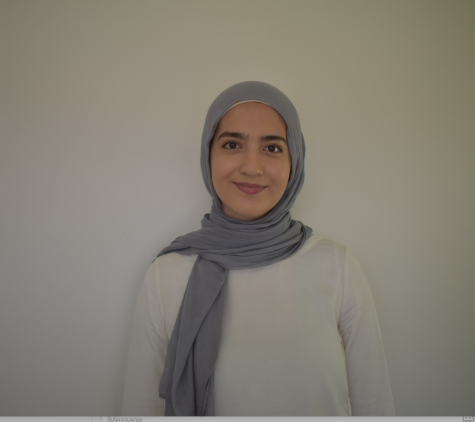As we enter spring, many are welcoming the new season by gardening. From landscaping and flowers, to fruits and vegetables, students and teachers are working in their homes and at school to fulfill their passions for cultivating plants. Here are their stories.
Science teacher Charles Cutelli:
Rose bushes were some of the first plants that science teacher Charles Cutelli started growing. Living in a rented home in the city, he only had access to a small plot which he landscaped with roses and other plants.
When he moved and bought his own home, he reached his growing potential and started cultivating fruits and vegetables in addition to his beloved rose bushes.
“My favorite plant is still rose bushes because they’re actually pretty easy and if you take care of them the right way, they produce really cool flowers. My wife also likes to make bouquets with them,” Cutelli said. “Last year I did tomatoes, peppers and watermelons. I like growing watermelons because that’s just fun to do. I’m not a huge watermelon [fan], sometimes I grow stuff just to grow it. But it’s fun to grow and my wife likes to eat them, so that’s good.”
Growing plants for 10 years and food for nearly three, Cutelli has had positive experiences with gardening. Occasionally, however, some plants have died or stopped growing back. For the most part, he says gardening is not as difficult as it seems.
“I would say trial and error in some regards [is how I learned]. Then in reality, it’s one of those things where plants are pretty adaptable and self-sufficient. It’s not rocket science. If you plant something even from seed, as long as you take care of it for a little bit, water them and don’t let the deer eat them, generally they do what they’re supposed to do,” Cutelli said.
Amongst the main causes for disappointment in his garden are deers who have eaten everything from roses to tomatoes.
“Unfortunately, out here we have a deer problem. Anytime you plant a rosebush, deer just mow them down. So I pivoted away from that for a little bit and started to try and plant some stuff that maybe they wouldn’t eat as much like hydrangea bushes and some other items,” Cutelli said. “Deer pretty much eat anything. So for me, it’s been a constant war with them, but I’ve got some tricks that I use to keep everything protected.”
In addition to growing for his own enjoyment, as a biology teacher, Cutelli has learned much about plants that he conveys to his students during class. He also hopes to incorporate more hands-on growing experiences for his students.
“Sowing seeds [is something] most kids probably have never done so that’s something that I’ve thought of. I have our study hall first hour and most kids are just going to sit and play on their phones. I told them the other day maybe I’ll bring in some pots because I got a bunch of seeds that I haven’t planted yet. Having them all plant something so that they can grow some on their own and take it home at the end of the quarter would be fun. Those are ideas that I’ve had as I’ve gotten more into this,” Cutelli said.
Out of the entire growing process, Cutelli’s favorite part is seeing the end result of what he planted. He also values sharing what he grew with his parents and in-laws.
“It’s fun to see what something came from to what it is now. It’s fun to be knowledgeable about something. A lot of people ask me questions just because they know that I like to [garden]. I consider it my hobby. I’m always out in the yard [passing] around and I’ve gotten more into it, so I prefer to go out there and do stuff like that than to sit inside,” Cutelli said.
Senior Amina Aser:
Senior Amina Aser’s first experience with gardening was in middle school when she helped grow pumpkins and flowers at her friend’s garden. She found joy in the planting process and decided to try it on her own.
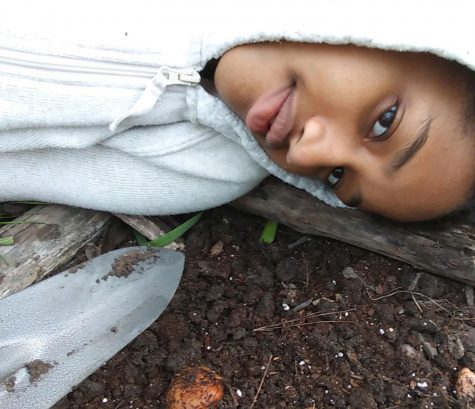
After convincing her mom to let her have a small portion of the backyard, Aser dedicated this land to her gardening activities. She approached gardening with a curious and experimental outlook, growing a variety of plants and observing them to learn about how they work.
“I wanted to feel like I owned something or like I could manage something. I didn’t get as much land as I wanted it but I was really excited about it,” Aser said. “The first thing I started growing in it was corn. I had a lot of trials like I started growing my seed inside first. There are a lot of experiments that I used to do with growing stuff in middle school. I remember I put some strawberries in some soil. I didn’t know that the soil would actually eat away at the strawberry. It fascinated me.”
Aser noticed much growth in her first corn plant when she transferred it to the outside plot. At a certain point, however, she recalls that the plant started dying.
“I was planting the corn way too close, so some plants were growing faster than others and they weren’t getting the amount of nutrients that they needed,” Aser said. “It made me realize how infestation can easily ruin your crop. How close you planted together can easily ruin your crop. It taught me new things about plant management that I kept in mind later on as I was growing stuff.”
From that point, Aser switched from growing on the plot to using it for composting her food scraps. It was then that an unexpected growth occurred.
“One day my compost actually started growing a tomato plant or two and I was really fascinated. I was throwing tomatoes in there as fertilizer so it was a real surprise to me once the tomato plant started coming out of the ground and it was honestly really exciting for me,” Aser said.
Her curiosity about nature continues to motivate her to take care of both houseplants and plants in her garden.
“Much of what I learned about plants has been my own experimentation. I don’t think it’s easy to understand things about plants until you’ve done it yourself. You don’t really understand how to fix a plant until you’ve looked at it and seen it happen in motion. And when you see infestations progress, it is cool seeing new species pop up on your plants or interact with what you’re growing, even though it’s detrimental,” Aser said. “It puts a new picture about how we grow our food and how difficult it could be. It’s just interesting to think about what new things I can do to grow successful plants. It makes me really curious.”
Using her past experiences, Aser looks to plant tomatoes, strawberries and other plants this year. She hopes to continue gardening in the future as well.
“I enjoy gardening because I can see something new every day [or] every time I go outside or look and see how the plants are doing. It makes me excited about what could happen or how am I going to enjoy it after I’ve done all this work. The journey is more fun than the reward because the journey, I feel like, is the reward. It feels like I have a purpose,” Aser said.
Activities secretary Joyce Debenport
Gardening for a number of years, activities secretary Joyce Debenport has developed creative landscaping skills that she applies to both her home and school.
In her yards at home, Debenport has several flower beds, planters and trellises that she uses to cultivate plants and beautify her space.
“I really like the climbing vineyard called Clematis. It’s just one of those plants that once it’s established, you do absolutely nothing and it comes back every year and it’s beautiful. I’ve got several around my yard and I just love them,” Debenport said. “Picking [plants] out is the most stressful part for me, because they’re just so many choices. But I love planting them and watching them flourish.”
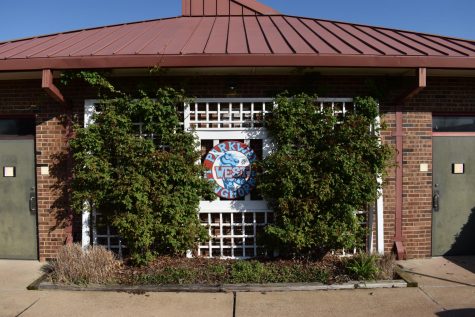
Activities director Joyce Debenport planted bushes and smaller plants to beautify the area near the football stadium.
(Ella Mercer)
At school, she works on beautification projects, buying and planting bushes near the football stadium, front doors, electric welcome sign and other locations around campus.
“On a self-level, I just like a lawn when it looks better. On a global viewpoint, [it’s important] to take pride in your surroundings and to make them appear cared for,” Debenport said. “I think a lot about certain schools in the area and how, if you’ve never been on their campus, it’s a nice place because things are picked up and things look like they have a purpose.”
Debenport’s office faces the school garden that the Environmental Club cultivates. She hopes to work with them this year and in the future on other school beautification projects.
“I work on the planters out in front of school. We haven’t done anything with those yet [but] I want to kind of work in conjunction with some groups here at school. I’ll buy the plants. They’ll either plant them or just take care of them during school. Then I’ll come back and do it in the summer,” Debenport said. “I feel like the school is a work in progress and I am excited that there are some groups that are interested in taking on more responsibility with regard to that when we get back into a regular school setting,”
With each gardening project she does, Debenport’s passion for landscaping continues to grow.
“I have this urge to beautify wherever I am. Whether it’s in my house or outside, I just really enjoy decorating and I feel like doing the landscape is a form of decorating,” Deponport said.


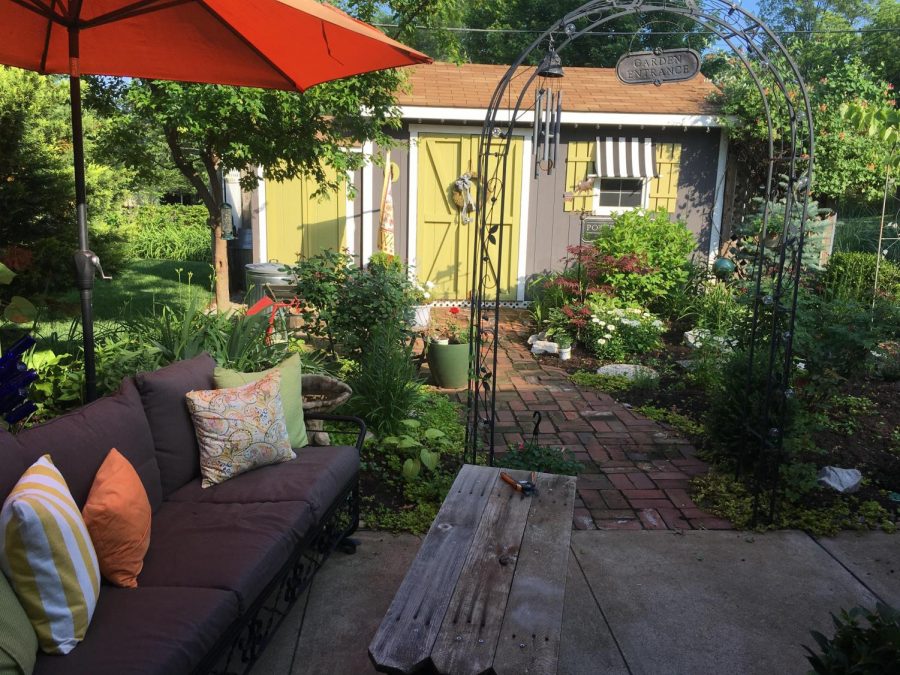
![Sophomore Aleix Pi de Cabanyes Navarro (left) finishes up a soccer game while junior Ava Muench (right) warms up for cross country practice. The two came to Parkway West High School as exchange students for the 2025-2026 school year. “The goal for the [exchange] program is to provide opportunities for both Parkway students and our international exchange students to learn about other cultures, build connections and become confident, capable, curious and caring — Parkway’s Four C’s — in the process,” Exchange Program Lead Lauren Farrelly said.](https://pwestpathfinder.com/wp-content/uploads/2025/10/Feature-Photo-1200x800.png)

![Gazing across the stage, sophomore Alexis Monteleone performs in the school theater. The Monteleone family’s band “Monte and the Machine” has been releasing music since 2012, but Alexis started her own solo career in 2024 with the release of her first single, Crying Skies. “My whole family is very musical, [and I especially] love writing [songs with them],” Monteleone said.](https://pwestpathfinder.com/wp-content/uploads/2025/09/DSC7463-1200x798.jpg)
![Amid teaching a lesson to her AP Calculus BC class, Kristin Judd jokes alongside her students in their funny remarks. Judd has always enjoyed keeping the mood light in her classroom, along with on the volleyball court. “[I enjoy] that side talk where you see [or] overhear a conversation and chime in, or somebody says something funny,” Judd said.](https://pwestpathfinder.com/wp-content/uploads/2025/09/image-1200x730.jpg)
![Eyeing the ball, junior Ella McNeal poses for her commitment pictures at Clemson University. McNeal’s commitment comes after months of contact with top Division 1 soccer programs. “ It has taken a lot to get to where I am, but I know that [what] I've already been through is just the beginning, and I can't wait for what is to come,” McNeal said.](https://pwestpathfinder.com/wp-content/uploads/2025/09/IMG_4926-1200x900.jpeg)

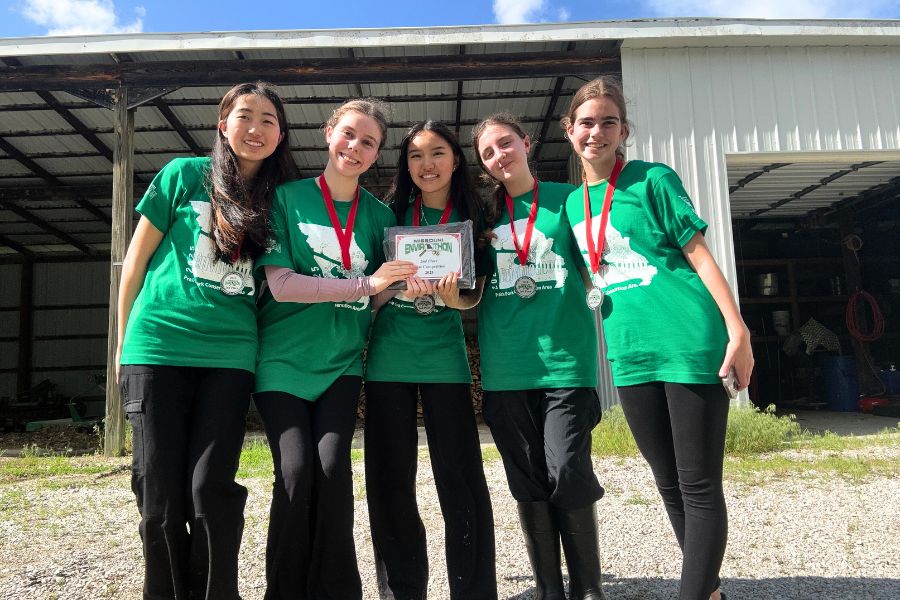
![Senior Adam Zerega stands with senior Dexter Brooks by farm equipment. Zerega often worked with friends and family on his farm. “I've been able to go to my family's farm since I was born. I [spend] at least three weekends a month [on the farm], so I'm there all the time,” Zerega said.](https://pwestpathfinder.com/wp-content/uploads/2025/04/IMG_4872-1200x900.jpg)
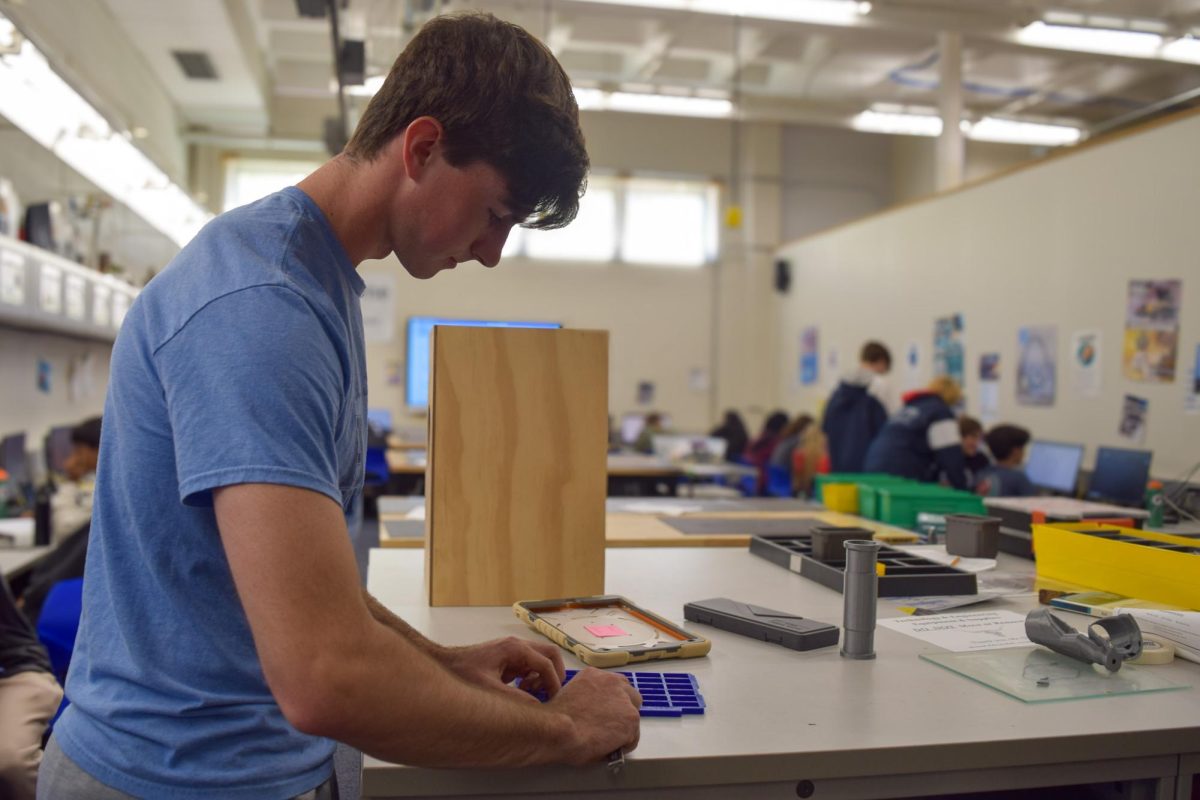
![Phage grown by senior Rio Naghibi Harat sit in petri dishes. Through Webster University, Naghibi Harat was given the opportunity to develop phage as a potential remedy for tuberculosis. “Phage are everywhere. I got mine from a soil sample. I'm not kidding; I picked [it] up from dirt. They're harmless, unless you code them to do something, and they can evolve. Virus antibiotics can't. They're one solid molecule. A strain of this bacteria [can evolve] that is resistant to [a] particular drug, [but] phage will evolve with the bacteria. They can see the changes, and they can be the change,” Naghibi Harat said.](https://pwestpathfinder.com/wp-content/uploads/2025/04/Flag-2.png)
